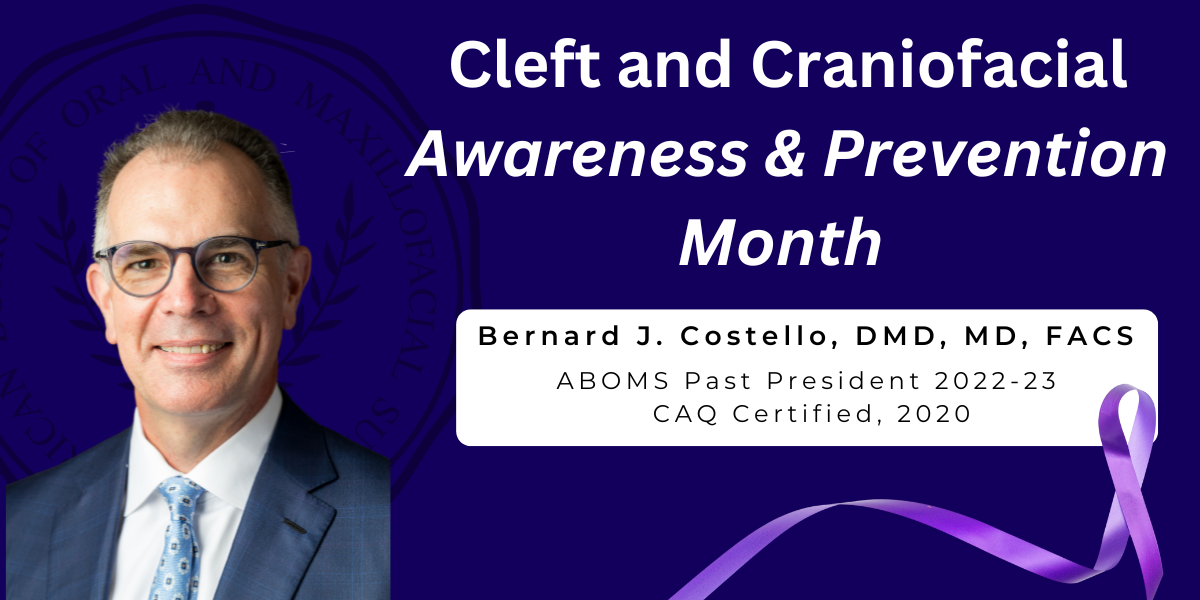
Jul 11, 2025
Honoring Cleft and Craniofacial Awareness and Prevention Month with Dr. Costello
In honor of National Cleft and Craniofacial Awareness and Prevention Month, Bernard J. Costello, DMD, MD, FACS shares his insights. As a Past President of ABOMS and a recipient of the Certificate of Added Qualifications (CAQ) in Pediatric Craniomaxillofacial Surgery (Cleft and Craniofacial), Dr. Costello offers a unique perspective shaped by years of experience and leadership at the highest levels of the specialty. Read more below:
What inspired you to pursue a career in the subspecialty?
I was inspired to pursue Pediatric Craniomaxillofacial Surgery due to its profound impact on children's lives, as well as my mentorship from Dr. Peter Quinn, the former chair of OMS at Penn and senior administrator for the Clinical Practices of the University of Pennsylvania. The ability to restore both function and appearance in young patients facing complex facial differences is deeply rewarding.
Share a patient story that shaped your passion and influenced your career.
One memorable patient was a young girl born with a severe cleft lip and palate. Through multiple surgeries and ongoing care, I witnessed her transformation from struggling with speech and feeding to thriving socially and academically. She recently completed her undergraduate degree in dance performance and she helps lead a studio locally. Her resilience and progress continue to inspire my dedication to our field.
From your perspective as a Past President, what is the value of the CAQ in Pediatric Craniomaxillofacial Surgery (Cleft and Craniofacial)?
As a Past President of ABOMS, I've seen firsthand the critical role of the CAQ in Pediatric Craniomaxillofacial Surgery. It signifies advanced expertise and a commitment to high standards of care, enhancing both professional credibility and patient outcomes. It is yet another way that ABOMS makes a difference through our attempts to protect the public and note expertise.
How has earning the CAQ influenced your career?
Earning the CAQ validated my specialized skills in this sub-discipline and provided a framework for ongoing professional growth. It has opened doors to collaborative opportunities and leadership roles within the field, significantly shaping my career trajectory.
What is something the public may not know about children impacted by craniofacial disorders?
Many are unaware of the challenges children with craniofacial disorders face beyond physical appearance. These conditions can affect speech, hearing, and even breathing, requiring comprehensive, interdisciplinary care. Working as a team of healthcare professionals committed to patients and families is one of the great rewards of being in this field. I regularly work with different specialists in a team setting that allows for amazing transformations of people’s lives and how they live them—not only their appearance.
How can greater awareness improve outcomes for patients and their families?
Increased awareness not only fosters understanding but also promotes early intervention and access to specialized care. By raising awareness, we can improve diagnostic timelines and ensure children receive timely treatments that can significantly enhance their quality of life. Legislators and the public need to know that these issues are incredibly common, and that they require very complex care. The financial burden is massive for these families and full insurance coverage is important for their well being.
What is your hope for the future of craniofacial care?
Looking ahead, my hope is for continued advancements in surgical techniques, interdisciplinary collaboration, artificial intelligence-informed best practices, and public education. I envision a future where every child born with a craniofacial disorder has access to comprehensive team care and achieves their fullest potential.